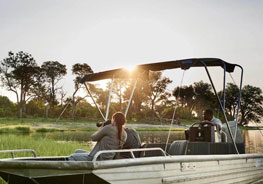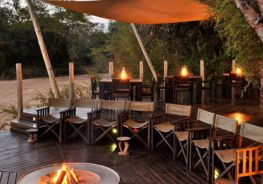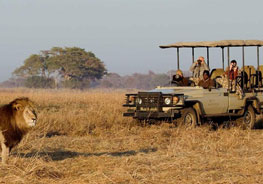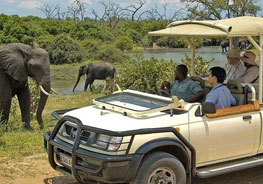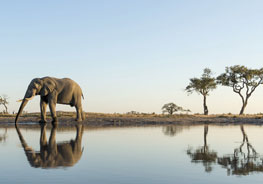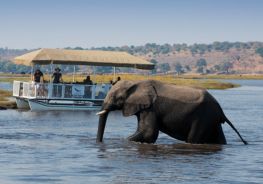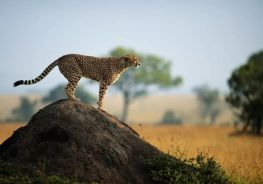Call Us
8:00am - 17:00PM
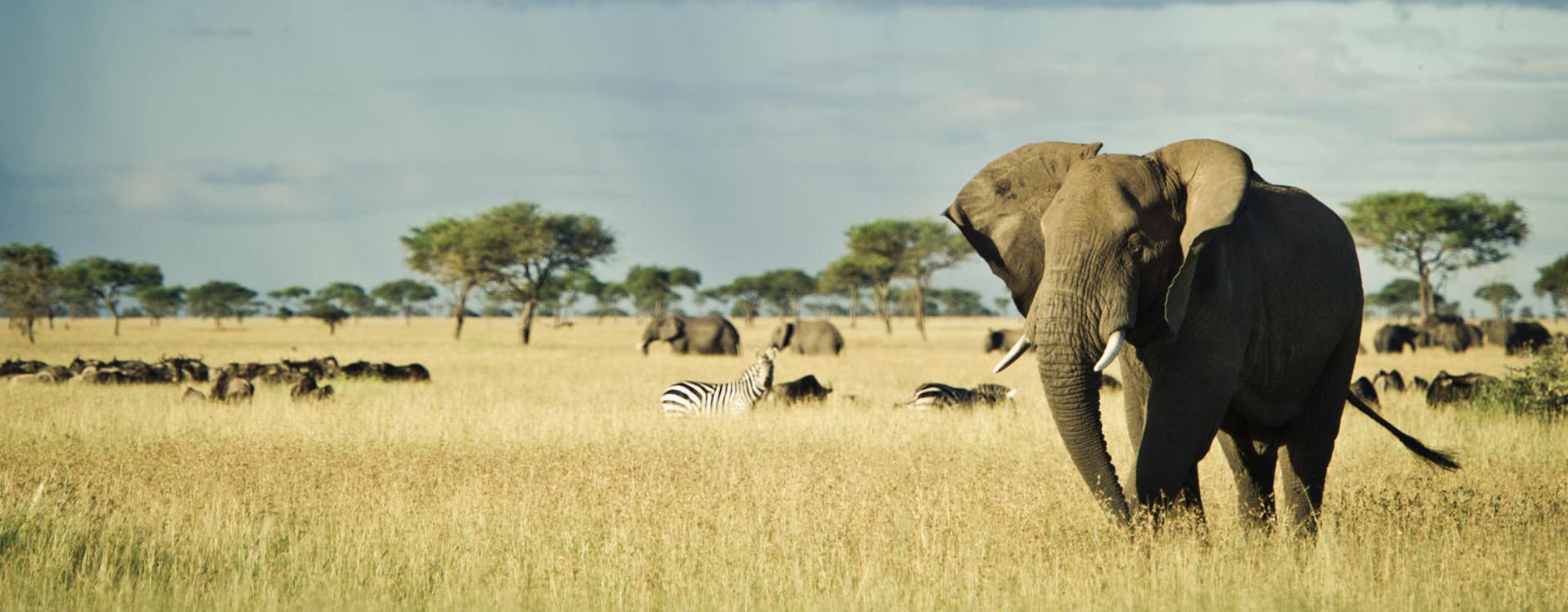
Best Time to Visit Chobe National Park
Chobe National Park
Best Time to Visit
The Best Time to visit Chobe National Park is from May to early November when you’ll experience the renowned dry-season game viewing. The one aspect that Chobe is known for – the massive herds of elephants can be spotted along with other wildlife on the banks of the Chobe River as well as in Chobe’s central Savuti region.
However, there isn’t one definitive answer as to what the Best Time Of The Year to Visit Chobe National Park is because it’s a year-round destination that offers a complete range of experiences regardless of the time of year. Below we’ll have a close look over the different seasonal aspects of the park, and the climate, plus offer you some of our bespoken suggestions to sign off.
Climate and Weather in Chobe National Park
Chobe National Park experiences a warm and hot climate that’s characterized by dry and wet seasons. The dry season in the park from May to August has the coolest temperatures and most of the precipitation occurs in the months of December and March. Below are the average temperatures according to each month of the year in the park:
|
MONTH(S) |
AVERAGE TEMPERATURES |
DESCRIPTION |
|---|---|---|
|
January and February |
31°C/87°F |
Some of the wettest months in the park Afternoon downpours are common with occasional thunderstorms |
|
March |
17°C/63°F |
The showers of rain are less frequent Though some thunderstorms may still occur |
|
April and May |
30°C/86°F |
The beginning of the dry season Mostly dry and sunny conditions |
|
June, July, and August |
27°C/81°F |
Virtually no rainfall The temperatures get a bit cooler with early mornings dropping to around 8°C |
|
September and October |
34°C/93°F |
These are the hottest months of the park Though temperatures at nighttime and early mornings fall significantly |
|
November and December |
18°C/64°F |
Hot and sunny conditions, making for pleasant safari experiences |
Falcon’s Further Eye-Openers: The last showers that mark the end of the wet season generally fall in the month of April. From May, the park’s dry season is in full flow with June and July being the coolest months.
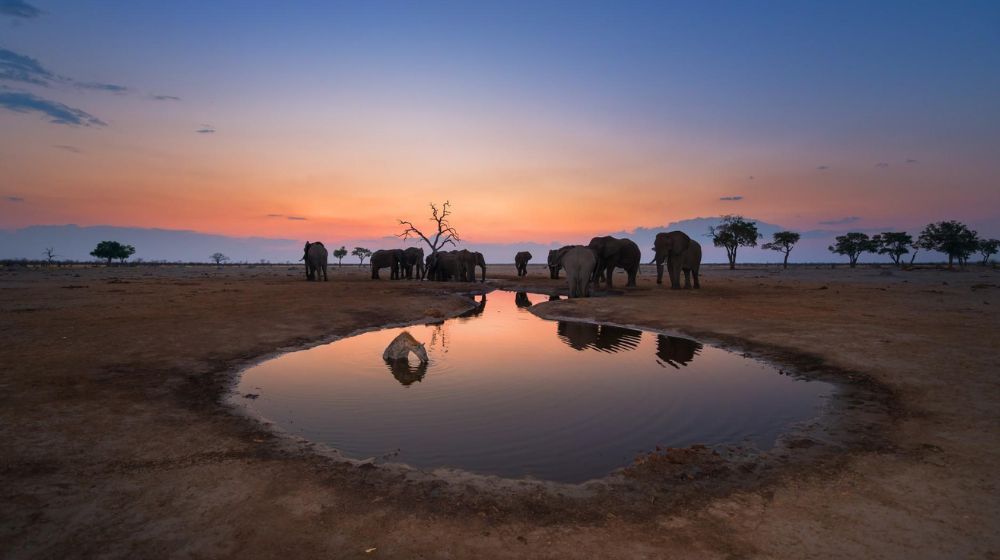
Rainfall Period
|
MONTH(S) |
AMOUNT OF RAINFALL (in millimetres) |
|---|---|
|
January |
128 mm |
|
February |
110 mm |
|
March |
67 mm |
|
April |
18 mm |
|
May |
2 mm |
|
June |
0 mm |
|
July |
0 mm |
|
August |
0 mm |
|
September |
1 mm |
|
October |
25 mm |
|
November |
42 mm |
|
December |
101 mm |
Seasonal Synopsis of Chobe National Park
Chobe National Park Safaris offer a complete package of adventures. A warm African breeze coupled with some amazing sunsets, broad skies and changing colours. All of this plus the topping of lily-padded waterways and some amazing wildlife viewing make this the perfect safari destination. All of this is possible in both seasons of Chobe.
This is exactly why there isn’t a concrete answer as to what’s the Best Time to Visit Chobe National Park. Chobe National Park Safari Packages offer a full range of experiences regardless of the time of year.
Alongside this, the park changes dramatically with the seasons – making Chobe a year-round Botswana Safari destination.
Botswana experiences both the dry and wet seasons. When deciding on the Best Time To Visit Chobe, consider the following seasonal aspects:
- A huge variety of bird species can be found in the park in the wet season.
- The migration of elephants and other animals happens during the dry season.
- The pans of the Savuti region offer unbelievable game viewing. Even though wildlife viewing is perfect here throughout the year, April, May and November stand out.
In general terms, the Best Time to Visit Chobe National Park is considered to be during the dry season. This is because the ever-increasing water-dependent animals concentrate around the Chobe River. And, if you can stand the heat and sunny conditions, there’s some sensational game viewing on offer for you!
On the contrary, if you prefer to indulge yourself in birdwatching, then the wet season is worth it. To offer you complete background on the Best Time to visit Chobe, here is a detailed comparison of both seasons:
|
CHOBE’S DRY SEASON (From April to October) |
CHOBE’S WET SEASON (From November to March) |
|---|---|
|
Wildlife viewing along the riverfront is simply splendid |
Best time for birdwatching in the park, due to the presence of migratory birds. |
|
Lots of sunshine and almost no rainfall |
Abundant numbers of baby animals that in turn attract the predators, making for great circle of life experiences. |
|
Sunset cruises along the Chobe River are phenomenal |
Prolific concentrations of zebras and other animals at the Savuti Marsh. |
|
July to October fall in the peak season of the park so expect a lot of crowds |
Packing waterproof clothing items is essential |
Falcon’s Savvy Tip – The weather conditions of Chobe National Park are difficult to predict but as long as you look at your safari as an all-encompassing adventure, you’ll certainly have a great time.
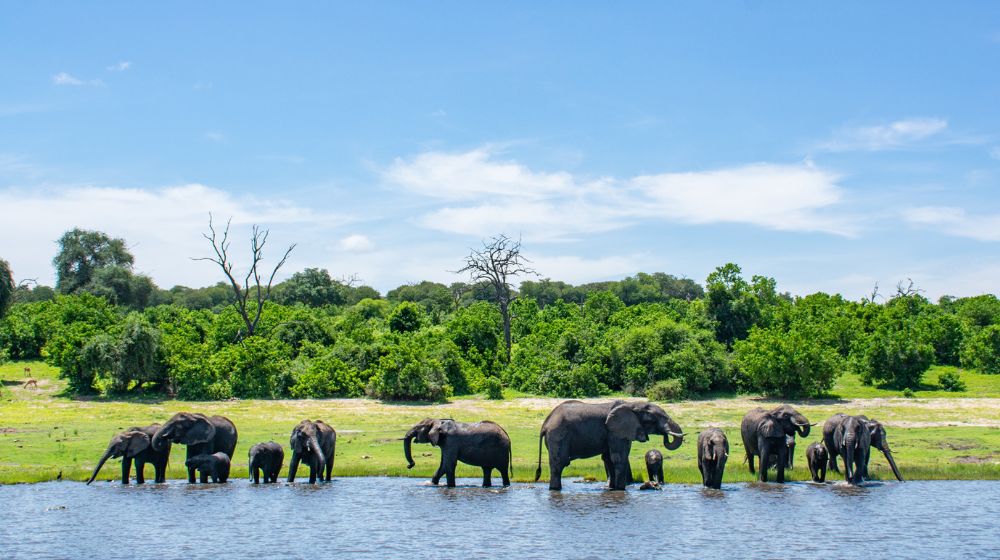
Monthly Rundown of Visiting Chobe National Park
Now that you the seasonal aspects of Chobe, it’s time to go in-depth about the Best Time to Visit Chobe National Park, and we’ll do this with the help of a monthly rundown. So, let’s make our way through it:
From January to March – Boundless birdwatching possibilities set against lush backdrops!
January falls in the period of the green season and you’ll get to gaze at the lush and vibrant surroundings while on a Chobe Safari. January also doesn’t fall in the high season of the park meaning that you’ll get to take advantage of reduced costs on accommodations.
- In February, thunderstorms arrive and they last for a short while paving way for clear skies in the daytime.
- Birdwatching Botswana Safari Tours are excellent in the park during this month as all the migratory birds have already made their way inside the premises.
March marks the start of autumn and is the last month of the summer rains. This is the Best Time to visit Chobe if you are on the lookout for photographic safaris.
In April and May – Boat safaris and incredible game viewing!
The autumn season is at full throttle in the month of April and boat safaris on the Chobe River are the perfect way to spot huge herds of elephants and cape buffaloes.
The riverfront area of the park is very frequented in the dry months, especially in the month of May.
May is considered the Best Time to Visit Chobe National Park and temperatures are cooler early in the morning. The Chobe River starts to get pretty busy as the peak season approaches.
From June to August – The definitive time for safaris!
These months are considered the best time for Botswana Safari Tours in Chobe. Wildlife viewing is the best it has ever been and elephant herds gather in masses on the banks of the Chobe River.
Sensible Suggestion – It tends to get very chilly at night and temperatures can even drop below zero, so it’s advised to pack warmer clothing items.
In September and October – spring arrives and so do the colourful birds!
If you want the best birdwatching Botswana Safari Tours then there’s no better time and place to be than these months in Chobe National Park. Besides birds, big game sightings are also reliable in September and October, especially in the Linyanti concession.
In November and December – The period of green transformation!
In the month of November, Chobe National Park sees the beginning of the green season. The first showers settle on the arid surroundings and sausage and acacia trees begin to bloom, triggering the calving season.
The start of the Zebra Migration is in the month of December. This is when hundreds of these animals make their way to the south through migratory routes from the Chobe to the Kalahari region.
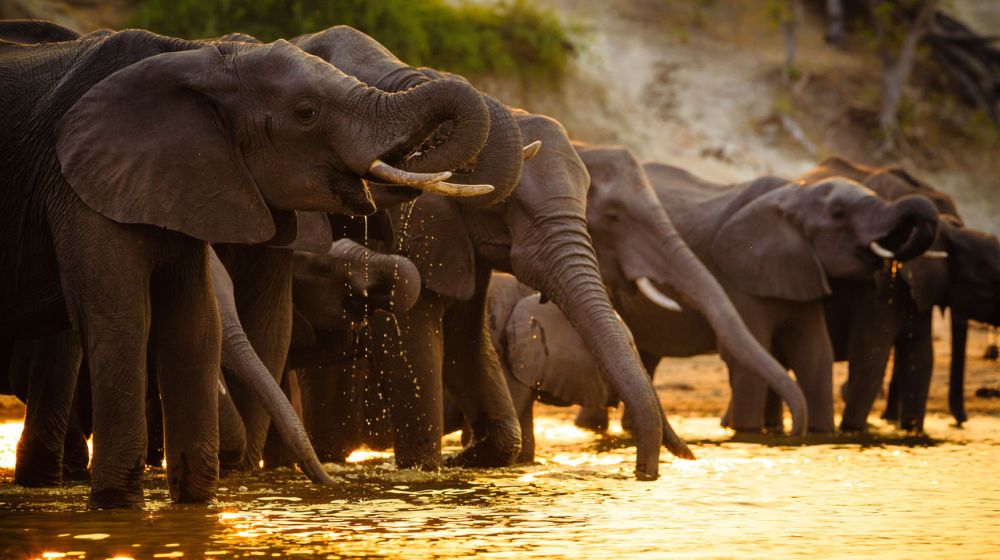
Best Time to Visit Chobe Based On Safari Activities
The Best Time to visit Chobe National Park also depends on the type of safari activity you’re interested to participate in. The following is a detailed overview of the best time to visit Chobe according to the safari activities.
|
SAFARI ACTIVITIES |
BEST TIME |
REASONS |
|---|---|---|
|
Game Drives |
Dry Season (from May to October) |
The vegetation is sparse, making it easier to spot wildlife. The animals are also more concentrated around the water sources, which means you're more likely to see large herds of elephants, buffalo, and other wildlife. |
|
River Cruises |
Dry Season (from May to October) |
The level of water in the river is at its lowest which makes spotting animals along the riverbanks easier. Elephants are known to swim across the river during this time, making for some great sights. |
|
Birdwatching |
Wet Season (from November to April) |
The park is transformed into a lush green paradise, and many migratory bird species are present, including the spectacular carmine bee-eater. |
|
Walking Safaris |
Dry Season (from May to October) |
The vegetation is less dense during this time, making it easier to walk through the park. It's important to note that walking safaris are not permitted in the park itself but in private reserves and concessions outside the park boundaries. |
Suggestions for the Best Time of the Year to Visit Chobe
Based on the information we’ve provided in the above sections, you must have figured out what your tastes and inclinations are when considering the Best Time to visit Chobe. So, half your work is done! Now we’ll offer some useful suggestions and advice from our end on both the dry and wet seasons.
Dry Season (May to October)
- Best time for game viewing, as animals tend to gather around the water sources.
- Temperatures can be cool in the morning and evening, so bring warm layers of clothing.
- Carry sunscreen, sunglasses, and a wide-brim hat as the sun can be intense during the day.
- Expect high concentrations of wildlife near the Chobe River.
- Consider a boat safari or a walking safari in addition to game drives.
Green Season (November to April)
- Best time for bird watching, as migratory birds arrive in the park.
- Temperatures can be hot and humid, so bring light and breathable clothing.
- Expect lush greenery and beautiful landscapes after the rainfall.
- Some lodges and camps may close during this season, so plan accordingly.
- Mosquitoes and other insects are prevalent in some regions, so bring insect repellent.
- Expect lower rates for lodges and camps due to lower demand.
Chobe National Park offers a distinctive safari experience throughout the course of the year. By taking into wary consideration the different seasons and planning accordingly, you can make the most of your visit and enjoy all that this stunning park has to offer.
Year-round rewarding safari experiences in Chobe!
All said and done, you’ve probably gathered that an exceptional safari experience is warranted no matter what time you decide to visit Chobe National Park. Still, there are some months that stand above the rest in terms of wildlife viewing and safari activities. So, first, decide what experience you’d like to undergo and then settle on the Best Time to visit Chobe National Park.
What better way is there to experience all that Chobe offers than by selecting one of our Chobe National Park Safari Packages?
Chobe National Park
Best Time to Visit
Related Chobe Travel Guide
We Think You’ll Love
Frequently Asked Questions
We Think You’ll Love
The Best Time to Visit Chobe National Park for a Safari is from May to the start of November. The period is good for observing wildlife and enjoying your stay in the luxurious lodges inside the park.
Nights can be chilly with temperatures occasionally falling below zero, so packing warm clothing for the evenings is advised on Chobe Safaris.
The weather during the dry season is mild and sunny, with low humidity and little to no rain. Temperatures range from around 20°C to 30°C, making it a comfortable time to visit.
The rainy season in Chobe National Park runs from November to April, with January and February being the wettest months. While the park is still open during this time, the weather can be unpredictable and the wildlife is more dispersed, making it harder to spot.
Yes, it is still possible to see Chobe National Park Wildlife during the wet season. However, the animals tend to disperse more due to the abundance of water and vegetation.
While there are no major festivals or events in Chobe National Park, there are a few cultural celebrations in nearby towns that visitors may want to attend, such as the Maun Festival in Maun, which celebrates the culture and traditions of the San people.
Visitors should pack light, comfortable clothing for warm weather, as well as sunscreen, sunglasses, and a hat. It is also recommended to bring a camera, binoculars, and insect repellent.
The dry winter months transform Chobe National Park into a wildlife haven. Animals migrate to the rivers and other remaining water sources from the arid interior.
They especially gather along the riverfront strip in the north of the park, which boasts the highest concentrations of wildlife. This makes the dry season exceptionally rewarding for Chobe National Park Tours.
Yes, visiting Chobe National Park during the wetter months is possible as it offers a unique and vibrant safari experience. While these months may see fewer tourists, the park's landscape transforms into a lush, green environment, and many newborn animals can be spotted. The rains bring a different kind of beauty to the area making it the best time for Botswana Safari Tours.
Visitors can witness a diverse assemblage of wildlife on Chobe National Park Safaris. The park is home to lions, wild dogs, cheetahs, leopards, giraffes, bushbucks, and blue wildebeests. The dry season especially sees large herds of buffalo and numerous hippos along the fertile floodplain.
When planning Chobe National Park Holidays, travellers should consider several factors to choose the best time for their visit. These include the type of wildlife they wish to see, the climate preferences, and the kind of safari experience they're looking for, whether it's a lush landscape during the wet season or the abundant wildlife viewings during the dry months.
We are thrilled to help you plan your perfect safari holiday
We'd be delighted to help you with any questions you have about properties & safaris. Please fill in the form below so that we can help you create your perfect safari holiday.
Or
Contact Us
Feel free to give us a call or send us an e-mail:
Start Planning Your Tailored African Safari

Expert Safari Knowledge
With decades of expertise, we're your trusted safari guides, ensuring every moment exceeds your expectations.

Tailor-made African Safaris
Tailored to your preferences, our African Safaris guarantee an adventure perfectly suited to your desires.

Long-term Relationships
Our enduring partnerships across Africa provide exclusive access and authentic experiences.

Carefree Travel
Leave your worries behind and accept carefree travel with Falcon Safaris, where every detail is handled to perfection.
Our Travelers Say
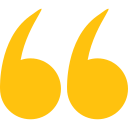
We travelled with Falcon Safaris in Zimbabwe and Botswana for 16 days. Falcon designed a wonderful trip with private guide to the most interesting sites in both countries. The organization of the whole trip was excellent, flights within the country, accommodation and activites. The guides were very knowledgable and told us a lot about the countries, their history, people, economy and much more. We visited the Great Zimbabwe Ruins, the Victoria Falls Tour and a number of national parks in both countries.
Rhino tracking was a real adventure! We had tremendous further game drives and saw very many animals - we did the Big Five. We had much more Victoria Falls Activities than planned and enjoyed very much.We strongly recommend Falcon Safaris to everyone planning a trip to Southern Africa and East Africa.
Wonderful trip to Zimbabwe and Botswana with excellent organization and very competent guides

Our Consultant Vimbai was very helpful and accommodating. We stayed at the Elephant hills hotel which was nothing short of amazing.Our activities included a helicopter flight, dinner cruise as well as a morning game drive. All the activities were absolutely amazing.
Exceptional!

We worked with Gertrude to schedule and organize everything and she did an excellent job. I asked a lot of questions via e-mail and she answered everyone in a timely helpful manner. Our guide at Victoria Falls was also great. He met us at the airport, provided a thoughtful tour of the Falls and got us to our next guide in Botswana. Our lodgings at River View Lodge were just as described- very comfortable and excellent food. All the staff were so pleasant and helpful. If I had to do it again I would arrange a morning boat ride as well. We only did the sunset boat rides and they were the high point of our entire trip- we saw so many animals and our guide was very knowledgeable. Just a great experience. Our lodgings at Oddball's Enclave was rustic and we loved it. So great to disconnect from the world for a bit. Leo, our guide, was the best - got us out and about, saw fantastic wildlife and got back to camp safely each time. Doc manages the camp so well. This whole trip was planned and organized by Falcon Safaris and we could not have been happier.
Fabulous, well planned trip

Falcon safaris have given my the correct advice with excellent service. The only suggestion will be to work closer with the lodges to confirm bookings as soon as possible. We have booked and pay our deposit a year in advance. We have only receive our final convermation from Chobe Safari lodge a week before departure. I do realize its not within your controle but with limit alternatives and a group of 14 people it becomes an issue to find alternative accomodation if the booking was cancelled.
Excellent and efficient service
Explore Our Africa With Customize Your Tour
We love Africa's diversity and create amazing trips for you. With 30+ years of experience, we customize every trip just for you.

